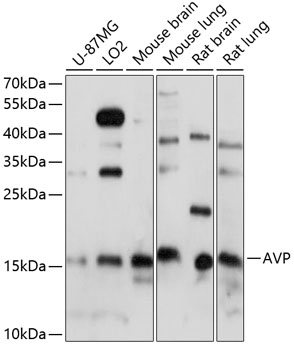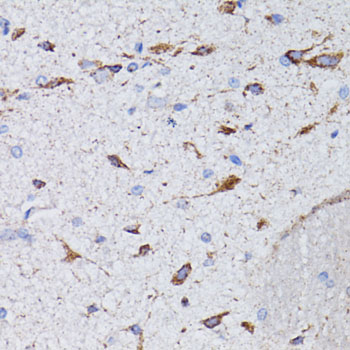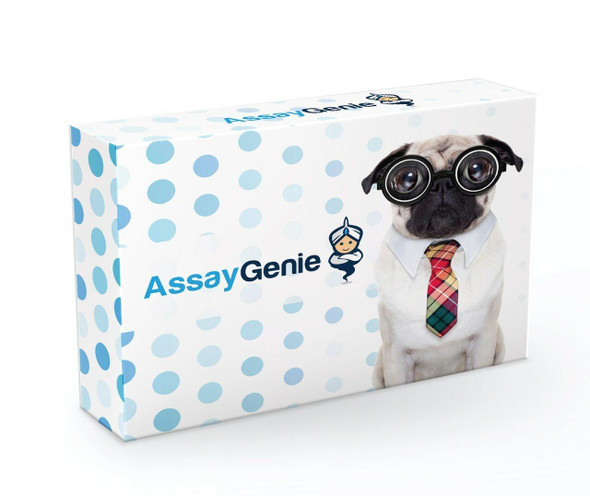Neuroscience
Anti-AVP Antibody (CAB1725)
- SKU:
- CAB1725
- Product Type:
- Antibody
- Reactivity:
- Human
- Reactivity:
- Mouse
- Reactivity:
- Rat
- Host Species:
- Rabbit
- Isotype:
- IgG
- Antibody Type:
- Polyclonal Antibody
- Research Area:
- Neuroscience
Description
| Antibody Name: | Anti-AVP Antibody |
| Antibody SKU: | CAB1725 |
| Antibody Size: | 20uL, 50uL, 100uL |
| Application: | WB IHC |
| Reactivity: | Human, Mouse, Rat |
| Host Species: | Rabbit |
| Immunogen: | Recombinant fusion protein containing a sequence corresponding to amino acids 20-164 of human AVP (NP_000481.2). |
| Application: | WB IHC |
| Recommended Dilution: | WB 1:500 - 1:2000 IHC 1:50 - 1:200 |
| Reactivity: | Human, Mouse, Rat |
| Positive Samples: | U-87MG, LO2, Mouse brain, Mouse lung, Rat brain, Rat lung |
| Immunogen: | Recombinant fusion protein containing a sequence corresponding to amino acids 20-164 of human AVP (NP_000481.2). |
| Purification Method: | Affinity purification |
| Storage Buffer: | Store at -20'C. Avoid freeze / thaw cycles. Buffer: PBS with 0.02% sodium azide, 50% glycerol, pH7.3. |
| Isotype: | IgG |
| Sequence: | CYFQ NCPR GGKR AMSD LELR QCLP CGPG GKGR CFGP SICC ADEL GCFV GTAE ALRC QEEN YLPS PCQS GQKA CGSG GRCA AFGV CCND ESCV TEPE CREG FHRR ARAS DRSN ATQL DGPA GALL LRLV QLAG APEP FEPA QPDA Y |
| Gene ID: | 551 |
| Uniprot: | P01185 |
| Cellular Location: | Secreted |
| Calculated MW: | 17kDa |
| Observed MW: | 17kDa |
| Synonyms: | AVP, ADH, ARVP, AVP-NPII, AVRP, VP |
| Background: | This gene encodes a member of the vasopressin/oxytocin family and preproprotein that is proteolytically processed to generate multiple protein products. These products include the neuropeptide hormone arginine vasopressin, and two other peptides, neurophysin 2 and copeptin. Arginine vasopressin is a posterior pituitary hormone that is synthesized in the supraoptic nucleus and paraventricular nucleus of the hypothalamus. Along with its carrier protein, neurophysin 2, it is packaged into neurosecretory vesicles and transported axonally to the nerve endings in the neurohypophysis where it is either stored or secreted into the bloodstream. The precursor is thought to be activated while it is being transported along the axon to the posterior pituitary. Arginine vasopressin acts as a growth factor by enhancing pH regulation through acid-base transport systems. It has a direct antidiuretic action on the kidney, and also causes vasoconstriction of the peripheral vessels. This hormone can contract smooth muscle during parturition and lactation. It is also involved in cognition, tolerance, adaptation and complex sexual and maternal behaviour, as well as in the regulation of water excretion and cardiovascular functions. Mutations in this gene cause autosomal dominant neurohypophyseal diabetes insipidus (ADNDI). This gene is present in a gene cluster with the related gene oxytocin on chromosome 20. |
| UniProt Protein Function: | AVP: Neurophysin 2 specifically binds vasopressin. Defects in AVP are the cause of diabetes insipidus, neurohypophyseal (NDI). A disease characterized by persistent thirst, polydipsia and polyuria. Affected individuals are apparently normal at birth, but characteristically develop symptoms of vasopression deficiency during childhood. Belongs to the vasopressin/oxytocin family. |
| UniProt Protein Details: | Protein type:Secreted; Secreted, signal peptide; Hormone Chromosomal Location of Human Ortholog: 20p13 Cellular Component: cytosol; dendrite; extracellular region; extracellular space; secretory granule Molecular Function:caspase inhibitor activity; neurohypophyseal hormone activity; neuropeptide hormone activity; protein kinase activity; receptor binding; signal transducer activity; V1A vasopressin receptor binding; V1B vasopressin receptor binding Biological Process: cell-cell signaling; circadian rhythm; elevation of cytosolic calcium ion concentration; generation of precursor metabolites and energy; grooming behavior; hyperosmotic salinity response; locomotory behavior; maternal behavior; negative regulation of apoptosis; negative regulation of caspase activity; negative regulation of female receptivity; negative regulation of transmission of nerve impulse; penile erection; positive regulation of cAMP biosynthetic process; positive regulation of cell growth; positive regulation of cell proliferation; positive regulation of cellular pH reduction; positive regulation of glutamate secretion; positive regulation of peptidyl-serine phosphorylation; positive regulation of prostaglandin biosynthetic process; positive regulation of systemic arterial blood pressure; positive regulation of vasoconstriction; renal water homeostasis; response to ethanol; response to nicotine; response to testosterone stimulus; signal transduction; social behavior; sodium-independent organic anion transport; transmembrane transport; vasoconstriction; water transport Disease: Diabetes Insipidus, Neurohypophyseal |
| NCBI Summary: | This gene encodes a member of the vasopressin/oxytocin family and preproprotein that is proteolytically processed to generate multiple protein products. These products include the neuropeptide hormone arginine vasopressin, and two other peptides, neurophysin 2 and copeptin. Arginine vasopressin is a posterior pituitary hormone that is synthesized in the supraoptic nucleus and paraventricular nucleus of the hypothalamus. Along with its carrier protein, neurophysin 2, it is packaged into neurosecretory vesicles and transported axonally to the nerve endings in the neurohypophysis where it is either stored or secreted into the bloodstream. The precursor is thought to be activated while it is being transported along the axon to the posterior pituitary. Arginine vasopressin acts as a growth factor by enhancing pH regulation through acid-base transport systems. It has a direct antidiuretic action on the kidney, and also causes vasoconstriction of the peripheral vessels. This hormone can contract smooth muscle during parturition and lactation. It is also involved in cognition, tolerance, adaptation and complex sexual and maternal behaviour, as well as in the regulation of water excretion and cardiovascular functions. Mutations in this gene cause autosomal dominant neurohypophyseal diabetes insipidus (ADNDI). This gene is present in a gene cluster with the related gene oxytocin on chromosome 20. [provided by RefSeq, Nov 2015] |
| UniProt Code: | P01185 |
| NCBI GenInfo Identifier: | 13259533 |
| NCBI Gene ID: | 551 |
| NCBI Accession: | NP_000481.2 |
| UniProt Secondary Accession: | P01185,O14935, A0AV35, |
| UniProt Related Accession: | P01185 |
| Molecular Weight: | 17,325 Da |
| NCBI Full Name: | vasopressin-neurophysin 2-copeptin preproprotein |
| NCBI Synonym Full Names: | arginine vasopressin |
| NCBI Official Symbol: | AVP |
| NCBI Official Synonym Symbols: | VP; ADH; ARVP; AVRP; AVP-NPII |
| NCBI Protein Information: | vasopressin-neurophysin 2-copeptin |
| UniProt Protein Name: | Vasopressin-neurophysin 2-copeptin |
| UniProt Synonym Protein Names: | AVP-NPII |
| Protein Family: | Vasopressin-neurophysin 2-copeptin |
| UniProt Gene Name: | AVP |
| UniProt Entry Name: | NEU2_HUMAN |








